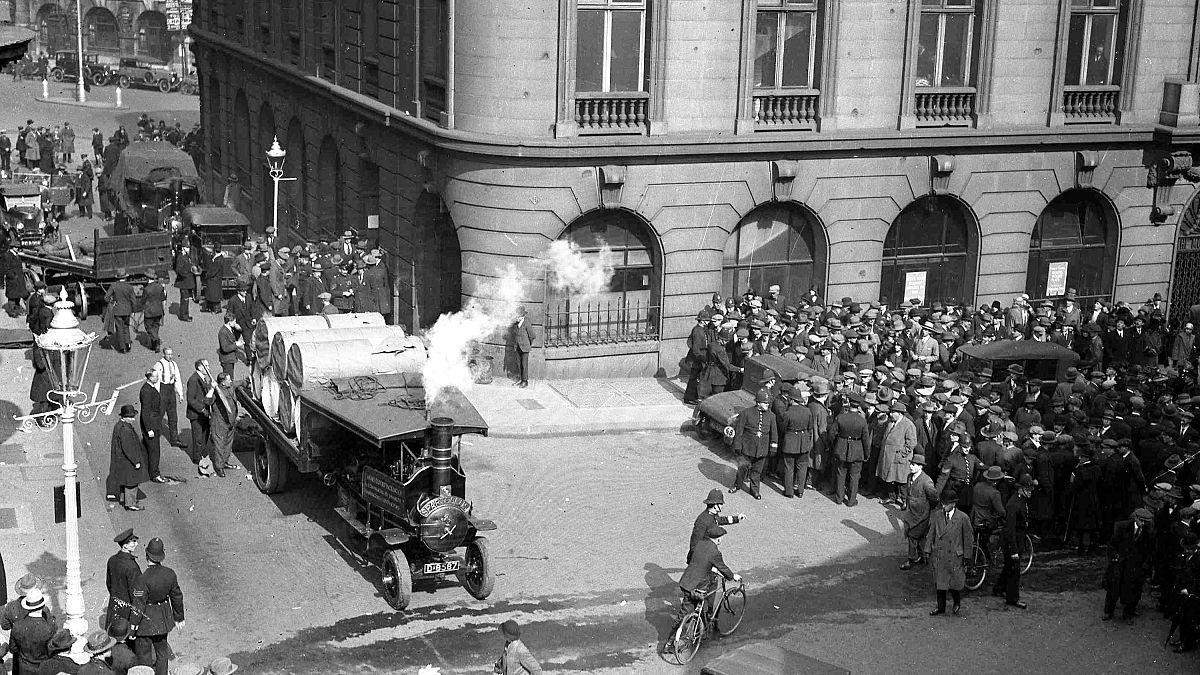Europe needs a roaring twenties to recover from the pandemic. British history provides some clues.
The economic historian, Professor Susan Howson, once wrote of a time in Britain when “conditions were tailor-made for a boom… a large budget deficit, money and ‘near money’ were cheap and plentiful … (with) a strong effective demand for both consumption goods and capital goods”. This was a time of surging stock exchanges and boundless business optimism.
Yet, such a convergence of conditions did not occur in the halcyon days of pre-1914 Britannia, or even in Thatcher’s economic revival of the 1980s. Remarkably, Howson was writing of the 1919 “restocking boom” when, for little more than twelve months, the sheer joy of surviving seemed to presage a new dawn of rising living standards and full unemployment.
Not even the calamitous Spanish flu pandemic of 1918-19 could dampen the post-war euphoria.
The horrors of the 1914-19 period differ fundamentally in scale from the tragedy of the current pandemic. However, the palpable sense of relief that the world would soon return to “normal” is shared between 1919 and 2021.
Economically, the 1919 of soaring public debts, low interest rates, disrupted trade and repressed demand is now mirrored in a time of unrivalled fiscal and monetary support for economies, businesses and jobs. Over £100 billion of excess savings were accumulated in Britain alone up to November 2020. Simultaneously, the British government deficit exceeded 13% of GDP. Today, as in 1919, stock markets are close to all time highs.
But Britain’s actions in the early 1920s – in seeking to return the economy quickly to pre-crisis norms – should provide valuable lessons for the European Union in attempting to sustain a post-pandemic boom.
In particular, Britain’s desire to stamp down on inflation and “extravagant living” (in the words of the Bank of England) did more than just restore normality. Rising interest rates were combined with lower government expenditure and restricted bank lending.
The objective was deflation. The goal was to force Britain back onto the Gold Standard currency system at its 1914 level against the US dollar. Tradition would trump uncertainty, chaos and revolution all in one go.
But, as Britain soon discovered, the benefits of returning to the old “normal” far outweighed the costs to the new reality. Deflation killed post-war optimism, increased unemployment and ultimately ensured that the economic success of the roaring twenties passed Britain by.
While much of Europe rebounded following the German restructuring of 1924, for Britain the 1920s remained routinely dismal. There was low growth, high debt and lots of talk about principles, precedent and moral leadership.
In the coming months the EU will face similar choices to Britain in 1919.
The ongoing coronavirus vaccination programmes should eventually end the economic restrictions associated with the pandemic.
Societies are set to be liberated from curfews and travel restrictions unknown since wartime. Cafes, bars, restaurants and hotels will soon teem with those who have survived, those eager (and desperate) to rekindle the necessity of basic human contact. Holiday bookings and foreign travel will surge.
However, for the Euro and the entire European integration process, the challenge will be even more profound.
Already conservative fiscal voices in Europe are growing nervous at the increasing cost of pandemic supports and rising public debts. Inflation, they worry, is not far behind. The reimposition of EU level budget rules and fiscal discipline remain their panacea. Just as the Gold Standard was supposed to save Britain in the 1920s.
But compared to Britain in 1919, the EU has advantages, even if they are not fully understood by its own policymakers.
The Euro’s floating exchange rate is complemented by an independent and internally focused European Central Bank. The Britain of a century ago had to contend with the opaque Bank of England and its adherence to a fixed exchange regime based on external economic conditions.
But Europe should still tread carefully.
The Britain of 1919 shows that too much deflationary medicine too soon may well send the whole economy to the ICU, even before there is a real inflation infection to fear. It’s not that debts, deficits and monetary policy no longer matter. They do. And they can have corrosive impacts on long term growth and productivity.
However, the political reality is that the EU has badly shaken the faith of its citizens in its economic management since 2007. The impact of the pandemic has further reduced the social and psychological resilience of its member states. 2022 must not become the new 1919 no matter how badly policymakers wish it to be. Too much has changed.
Rather, the EU should hold firm and commit to a phased reduction of fiscal supports over the medium term. Such a measured withdrawal will complement returning consumer confidence, societies reopening and the return of vibrant life to towns and cities. But the EU’s fiscal rules should remain suspended and ultimately be reworked and simplified to reflect the lessons of the last two decades of crises.
Ultimately, it is the management of a post-pandemic recovery that will determine the EU’s success (or failure) in the coming decade.
Europe needs a roaring twenties to recover. British history provides the clues.
- Dr Eoin Drea is a Senior Research Officer at the Wilfried Martens Centre for European Studies.
____________
Are you a recognised expert in your field? At Euronews, we believe all views matter. Contact us at view@euronews.com to send pitches or submissions and be part of the conversation.
